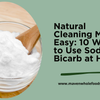The Rise of Organic Flours: A Smart Choice for Health-Conscious Bakers
- by K V
In today’s fast‐paced world, where every ingredient on our plate is carefully checked for quality and purity, a quiet revolution is happening in kitchens across the country. More health‐conscious bakers are switching to organic flours—not only for the promise of better taste, but also for the benefits of cleaner, chemical‐free ingredients and sustainable farming practices.
A New Way of Thinking in Baking
Baking has changed from a simple daily task into a mindful art. More and more, bakers want to know exactly where their food comes from and how it is made. They choose ingredients that not only deliver great flavour but also match their ethical and environmental values. Organic flours are leading this change, offering a natural alternative to the usual supermarket choices.
What Is Organic Flour?
Organic flour is made from grains grown without synthetic fertilisers, pesticides, or genetically modified seeds. Instead of chemicals, organic farmers use natural methods like crop rotation, composting, and biological pest control. This careful approach helps keep the soil healthy and the crops strong.
When the wheat is harvested, it is milled into flour without using harsh bleaching agents or chemical preservatives. This means organic flour stays as natural as possible, preserving the grain’s original nutrients and flavour.
Why Choose Organic Flour?
Fewer Chemicals for a Healthier Choice
One of the main reasons bakers choose organic flour is to avoid the chemicals found in conventional farming. Regular flour might have traces of pesticides or herbicides, while organic flour is free from these unwanted chemicals. For those with sensitivities or anyone who wants to eat more naturally, this is a big plus.
Better Nutritional Profile
Because organic farming focuses on soil health, organic grains may contain higher levels of vitamins, minerals, and antioxidants. The natural methods used in organic farming help the grain keep its natural oils, proteins, and nutrients. This means the flour not only tastes better but can also offer a more wholesome nutritional profile.
Enhanced Flavour and Baking Quality
Many bakers have noticed that organic flour can improve the taste and texture of their baked goods. The natural enzymes and proteins in organic flour help develop gluten better, leading to a superior rise, texture, and flavour in breads, cakes, and pastries. Whether you’re baking a hearty sourdough loaf or delicate biscuits, organic flour can give your creations a noticeable boost.
Environmental and Ethical Benefits
Choosing organic flour is also a win for the environment. Organic farming practices promote biodiversity, help conserve water, and reduce soil degradation. By opting for organic, you support farming methods that work with nature instead of against it. For many, this choice reflects a deeper commitment to sustainability and ethical food production.
The Health Benefits Beyond Baking
For health-conscious bakers, the benefits of organic flour go beyond the kitchen. Eating food made from ingredients free of synthetic chemicals is a step toward a healthier lifestyle. Every bite of a freshly baked loaf or pastry made with organic flour represents a choice for better well‐being. This simple change can make you feel good about what you eat and how it is produced.
How Organic Flour Enhances Your Baking
Artisan bakers and home enthusiasts are discovering that organic flours can elevate the quality of their baked goods. Here’s how:
- Improved Gluten Development: Organic flour’s natural proteins help create better gluten, which is essential for a good rise and chewy texture in breads.
- Richer Flavour: With fewer chemical alterations, the natural taste of the wheat is preserved. This can make your recipes taste more authentic and satisfying.
- Better Texture: The natural oils in organic flour can result in a softer and more elastic dough, improving the overall quality of your baked items.
This means whether you’re crafting a crusty sourdough or a batch of cookies, organic flour can help you achieve a better result.
Choosing the Right Organic Flour
For those ready to make the switch, selecting the best organic flour is important. Look for suppliers who are open about their farming and production methods and are dedicated to sustainable practices. If you’re looking to buy online, consider trusted sources like Maven Wholefoods. They offer high‐quality organic flours at competitive prices and support ethical farming practices.
Final Thoughts
The rise of organic flours is more than just a passing trend. It shows that modern bakers care about the quality and origin of their ingredients. Organic flour offers a cleaner, more natural option that benefits your health, improves your baking, and supports sustainable farming.
If you’re looking to enhance your baking and make a positive impact on the environment, switching to organic flour is a smart choice. Whether you are perfecting a family recipe or trying out a new artisan creation, organic flour can help you achieve a tastier and healthier bake.
Would you choose organic flour for your next bake? Share your thoughts and experiences in the comments below!
- Posted in:
- Artisan Baking
- Clean Eating
- Health-Conscious Bakers
- Organic Flour
- Organic Ingredients
- Sustainable Farming





